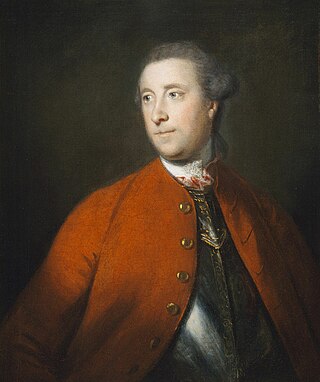Related Research Articles
Brigadier-General John Middleton MP was a British Army officer and Scottish Whig politician who sat in the House of Commons almost continuously between 1713 and 1739.
Lieutenant-General William Kerr, 2nd Marquess of Lothian, was a Scottish peer who held a number of minor military and political offices. He was known by the courtesy title of Lord Newbattle until 1692, when he succeeded as Lord Jedburgh, then as Marquess of Lothian when his father died in 1703.
Charles Ross was a Scottish general and Member of Parliament.

Charles Cathcart, 8th Lord Cathcart was a British Army officer. Before 1732 he was known as The Honourable Charles Cathcart.
Lieutenant-General Lord George Beauclerk was a British Army officer, the sixth son of Charles Beauclerk, 1st Duke of St Albans by his wife Diana, daughter of Aubrey de Vere, 20th Earl of Oxford.
George Reade, of Shipton-under-Wychwood, Oxfordshire, was a British Army officer and Whig politician who sat in the House of Commons from 1722 to 1734.
General Sir Philip Honywood KB was a British Army officer.
Lieutenant-General James Tyrrell of Shotover, Oxfordshire, was a British Army officer and Whig politician who sat in the House of Commons from 1722 to 1742.
Lieutenant-General Owen Wynne (1665–1737) was an Irish general and commander in the British Army, and a member of the Parliament of Ireland.

Major-General John Barrington was a British Army officer who was the third son of John Barrington, 1st Viscount Barrington.
General the Honourable John Fitzwilliam was a British Army officer.

Brigadier-General Thomas Paget was a British Army officer and politician who sat in the House of Commons from 1722 to 1727. He was the ancestor of the Paget family, Marquesses of Anglesey.
Brigadier-General William Newton was an officer of the British Army.
Lieutenant-General William Barrell was an officer of the British Army.
Lieutenant-General Edward Pole was an officer of the British Army.
Major-General Charles Jefferyes was an officer of the British Army.
Major-General John Moyle was an officer of the British Army.
Major-General Richard O'Farrell was an officer of the British Army.
Lieutenant-General Thomas Meredyth or Meredith, of Chelsea, Middlesex, was an Irish officer of the British Army and a politician who sat in the Parliament of Ireland from 1703 to 1719 and as a Whig in the British House of Commons from 1709 to 1710..
Lord Mark Kerr was a Scottish-born professional soldier, who served in the War of the Spanish Succession and the War of the Quadruple Alliance. He reached the rank of General in the British Army, and held a number of important administration posts, including Governor of Edinburgh Castle.
References
![]() This article incorporates text from this source, which is in the public domain :Historical Records of the British Army by Richard Cannon.
This article incorporates text from this source, which is in the public domain :Historical Records of the British Army by Richard Cannon.
- Historical Record of the Thirty-Sixth, or the Herefordshire Regiment of Foot (1853) pp. 113–114
- Historical Record of the King's, Liverpool Regiment of Foot, ed. A. Cuningham Robertson (1883) p. 266